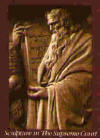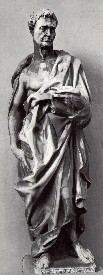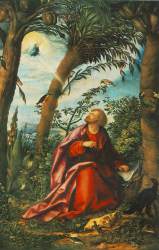
Insights from the New Testament...
Moses' method of ratifying the covenant is highly significant as it reminds us of our Lord's action at the Last Supper (Matthew 26:27-28), and both the cost and benefits, of the redemption Christ has won for us (Hebrews 10:11-12).
Indeed, both Old and New Covenants alike bear witness to the solemn fact that, without the shedding of blood, there is no forgiveness of sins (Hebrews 9:22).
(We recommend that you read the whole of Hebrews 9 and 10 to gain a fuller appreciation of the significance of Christ's sacrifice for us.)
|
... records that he was first given the commandments verbally by God (Exodus 20:1, 22, 21:1) - that is to say, God breathed them out. When Moses had conveyed them to the people he then wrote them down (Exodus 24:3-4). After completing this task he publicly read the newly composed Book of the Covenant, after which he ratified the agreement between the Lord and his people by sprinkling the blood from a sacrifice over them (Exodus 24:7-8). It was only on a subsequent encounter with the Lord that he was given the stone tablets which God himself had inscribed (Exodus 24:12 and 31:18).
In a similar way, when God repeated his commands, he first of all gave them verbally to Moses (Exodus 34:10-26), and only then writes them on the stone tablets which Moses had taken with him up Mount Sinai, as the Lord instructed him (Exodus 34:1-4 and 34:27-28). The significant difference was that, although Moses had destroyed the original set of tablets in his anger at seeing the people's idolatry (Exodus 32:19), the Book of the Covenant would have still been intact. There was, therefore, no need for him to write it a second time. However, the stone tablets inscribed with the commandments - the Testimony (Exodus 31:18 and 32:15 (NIV-UK)) - needed to be replaced so there would be a tangible witness to the covenant God had made with his people.
Nearly forty years later, in preparation for the entry into Canaan, Moses wrote further collections of laws at God's instruction (Deuteronomy 31:9 and 31:24-26)), together with the words of the song he was to teach to the assembled people of Israel (see Deuteronomy 31:19, and Deuteronomy 31:30-32:43 for the song itself). Moses' exhortation to the assembly of Israel after he had recited the song is applicable to all readers of any part of the Scriptures - "These instructions are no mere words - they are your life!" (Deuteronomy 32:47). We therefore do well to take them to heart!
(Some
authorities consider that the Book of the Law mentioned in the second reference above was the book discovered during the restoration of the Temple while Josiah was king of Judah - see 2 Kings 22:8 and 2 Chronicles 34:14. The effect of this discovery forms an important part of our Bible Focus on Revival!.)

... were acutely conscious that the words they spoke were not their own, but the very words of the Lord (see for example, Jeremiah 2:1, 3:11-12, 7:1-2, and Ezekiel 2:1-2, 3:1-3, 6:1).
The conviction that they were handling the very words of God himself applied equally to what the prophets wrote (see for example Jeremiah 30:1-2 and 36:1-2), even, on one remarkable occasion, to the extent of reconstructing, and adding to, a manuscript that had been destroyed by the king of Judah (see Jeremiah 36:21-28 and 36:32).
The whole of Jeremiah 36 is well worth reading as a testimony to God's concern for the preservation of his Word, confirming the statement made to the prophet at the outset of his ministry in Jeremiah 1:12 (NIV-UK).
(Click on the following reference to see this verse in a number of other versions: Jeremiah 1:12).
Paul ...

... was able clearly to distinguish between what was given to him by direct revelation from the Lord and what was the product of his own judgment, as he is at pains to point our in 1 Corinthians 7:10-12).
However, since even what Paul considered to be his own judgment was informed and guided by the Holy Spirit, it has been included as part of God's Word to us.
Paul was also careful to distinguish between when he is transmitting what, even in the space of less than fifty years, had already become established as accepted tradition (as in 1 Corinthians 11:23-26 and 15:3-7), and when he was recording fresh revelation (as in 1 Thessalonians 4:15-18). For this reason he was not ashamed of the message he preached (Romans 1:16-17) and rejoiced when it was received as it truly was (and is, and always will be), God's own Word (1 Thessalonians 2:13).
(Visitors from The Unity of Scripture return to Main Text)
Peter ...

... recognised that the Paul was specially guided by God in what he wrote, even though he was sometimes difficult to understand and frequently misrepresented (2 Peter 3:15-16).
Like Paul, Peter also recognised that the Word he proclaimed was not his own, but was a message from the Lord (1 Peter 1:24-25).
(Visitors from The Unity of Scripture return to Main Text)
John ...

... testifies to his inspiration in a rather less direct way. In 1 John 4:6 he offers a test for deciding between true and false teaching: what agreed with the teaching he had given was to be accepted as true: what did not agree with his teaching was to be rejected as false.
This was not because John was conceited, but simply because he knew that what he taught was the truth. He had been present when Jesus had spoken about the coming of the Holy Spirit (John 14:26 and 16:13-14), which he, together with the other apostles and many other believers, had received at Pentecost (Acts 2:1-4).
Moreover, John had the witness of his own hearing, sight and touch that what he was writing about was true (see 1 John 1:1-5).
John the Divine ...
 ... whom many consider to be the same person as the apostle John, states that he wrote the Book of Revelation as a circular letter to the seven churches in the Province of Asia (Revelation 1:4) at the personal instruction of the Lord Jesus, the living one who died and who is now alive forever and ever! as a record of the things that are now happening and ... will happen later (Revelation 1:10-11 and 1:18-19). John also records that the seven individual letters which immediately follow were written by direct dictation from the Lord (Revelation 2:1, 2:8, 2:12, 2:18, 3:1, 3:7 and 3:14).
... whom many consider to be the same person as the apostle John, states that he wrote the Book of Revelation as a circular letter to the seven churches in the Province of Asia (Revelation 1:4) at the personal instruction of the Lord Jesus, the living one who died and who is now alive forever and ever! as a record of the things that are now happening and ... will happen later (Revelation 1:10-11 and 1:18-19). John also records that the seven individual letters which immediately follow were written by direct dictation from the Lord (Revelation 2:1, 2:8, 2:12, 2:18, 3:1, 3:7 and 3:14).
John tells us there were three further occasions when he was directly commanded to write (Revelation 14:13, 19:9 and 21:5), but is also careful to record that there was one event he was forbidden to record (Revelation 10:4).
John the Divine's testimony serves to remind us that God's Word is, quite literally, a divine revelation to the human race. We can know only as much about God and his purposes as he has chosen to reveal to us. To attempt to know more is futile (Job 11:7-9), since God's thoughts and ways are incomprehensible to us (Isaiah 55:8-9 and Romans 11:33-36). Therefore, we must not attempt to add to, or subtract from, God's Word (1 Corinthians 4:6 (NIV-UK)) and Revelation 22:18-19). Yet, by a process we cannot begin to understand, God's Word - whether spoken or written - will always produce fruit, and accomplish what he intends for it everywhere he sends it (Isaiah 55:10-11).






